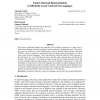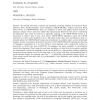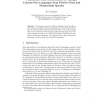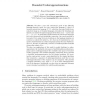129
click to vote
JMLR
2010
14 years 9 months ago
2010
We present a polynomial update time algorithm for the inductive inference of a large class of context-free languages using the paradigm of positive data and a membership oracle. W...
103
click to vote
DLT
2009
14 years 12 months ago
2009
Seki et al. (1991) proved a rather weak pumping lemma for multiple context-free languages, which says that any infinite m-multiple context-free language contains a string that is p...
138
click to vote
JACM
2000
15 years 1 months ago
2000
We identify and study a natural and frequently occurring subclass of Concurrent Read, Exclusive Write Parallel Random Access Machines (CREW-PRAMs). Called Concurrent Read, Owner Wr...
117
click to vote
JALC
2007
15 years 2 months ago
2007
In this paper, we consider the enumeration of context-free languages. In particular, for any reasonable descriptional complexity measure for context-free grammars, we demonstrate ...
123
click to vote
ENTCS
2010
15 years 2 months ago
2010
Solutions of recursive program schemes over a given signature were characterized by Bruno Courcelle as precisely the context-free (or algebraic) -trees. These are the finite and ...
125
click to vote
ICGI
2010
Springer
15 years 3 months ago
2010
Springer
This paper presents an efficient algorithm that identifies a rich subclass of multiple context-free languages in the limit from positive data and membership queries by observing wh...
FSTTCS
2008
Springer
15 years 3 months ago
2008
Springer
Several recent works have studied subfamilies of deterministic context-free languages with good closure properties, for instance the families of input-driven or visibly pushdown la...
101
click to vote
CAV
2010
Springer
15 years 5 months ago
2010
Springer
We show a new and constructive proof of the following language-theoretic result: for every context-free language L, there is a bounded context-free language L L which has the same...
118
click to vote
MFCS
2001
Springer
15 years 6 months ago
2001
Springer
Abstract. We prove that the class of context-free languages with polynomially bounded ambiguity (PCFL) is the closure of the class of unambiguous languages (UCFL) under projections...
121
click to vote
STACS
2009
Springer
15 years 8 months ago
2009
Springer
The paper investigates the power of the dynamic complexity classes DynFO, DynQF and DynPROP over string languages. The latter two classes contain problems that can be maintained us...




